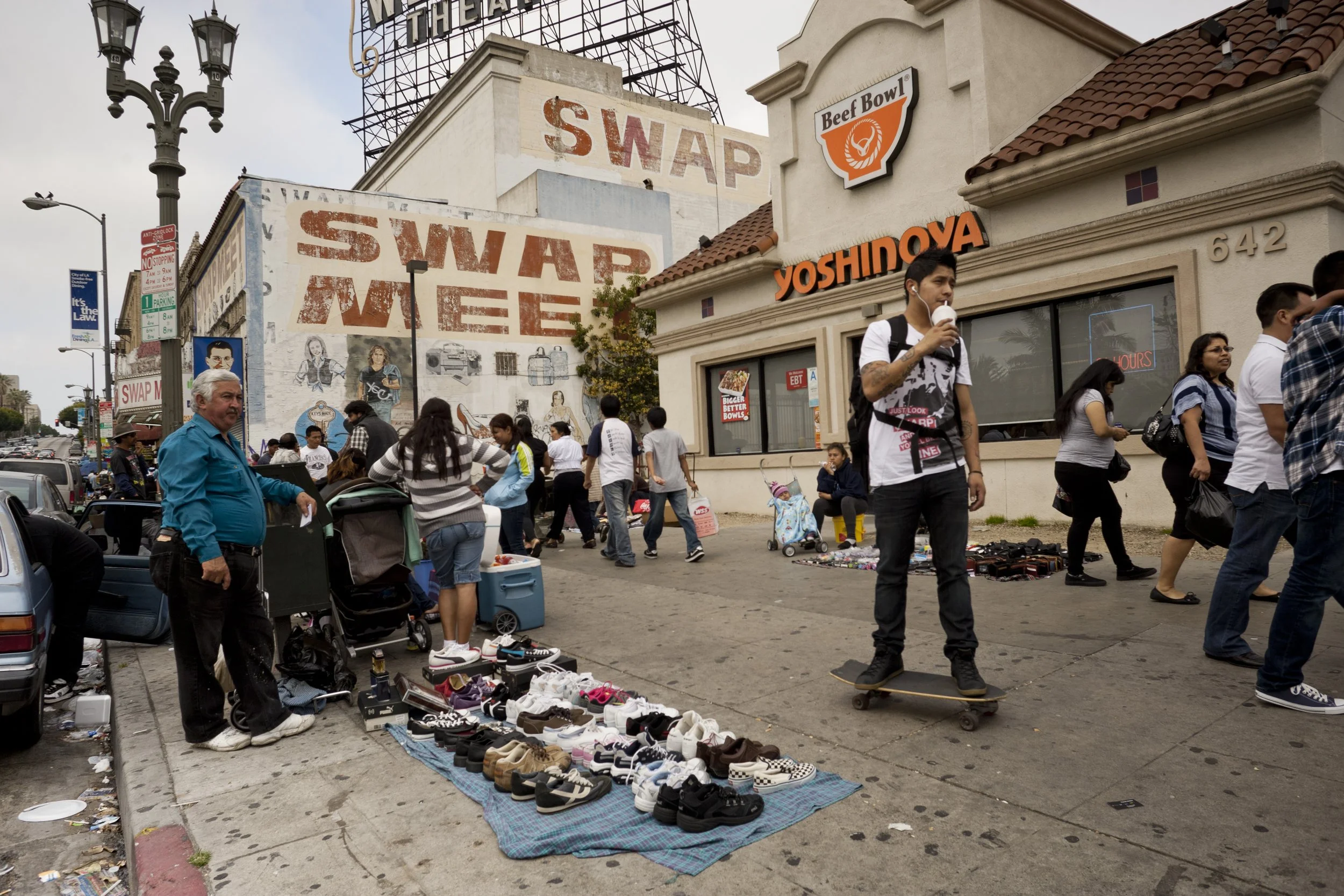
Vending rewards self-sufficiency and reimagines public space
Some fifty thousand vendors, most undocumented, take to LA’s sidewalks every day, hawking whatever they can make or recycle or buy in bulk and sell piecemeal. For a population lured by the promise of work yet barred from the formal workforce, these impromptu bazaars represent an entry-level marketplace with almost no barrier to participation.
They also cater to the appetites and budgets of a consumer base that, by necessity, eats and shops on foot—nannies, busboys, dishwashers, gardeners—folks without cars or kitchens or enough room at home to ever truly relax.
Given the many less beneficial alternatives that a frustrated labor pool could pursue, to vend is to create and contribute: to earn what academics call “social citizenship,” where legal recognition is denied.
The vending economy, in other words, makes perfect cultural and commercial sense, which is why most world capitals celebrate their street food and accommodate their flea markets. Just not LA.
LA’s longest-running act of civil disobedience
Despite its reputation as a liberal city and a street food incubator—a sanctuary for immigrants, the birthplace of the taco truck—Los Angeles has long viewed peddling as a nuisance. The antithesis of the modern, clean, suburb-by-the-sea that the business and political class has been seeking to build ever since California ceased belonging to Mexico.
In 2012, not long after moving to MacArthur Park, I did a story for The American Prospect about LA’s low-grade forever war against street vending, “The Geography of Getting By.” It gave me an opportunity to dig into that history, which dates all the way back to police crackdowns on tamale wagons in the late 1800s. A roundup of vendors in 1906 filled an LA courtroom with a “motley array of representatives of at least a half-score of nations,” as one turn-of-the-century newspaperman put it. In the years after the Depression, a downtown merchants association demanded that the city do something about the hucksters, beggars, moochers, fakirs, and buskers invading the central city, proof that “the Los Angeles sidewalks are the most misused . . . of any in the United States.” The city has gone after newspaper hawkers, put the brakes on flower stands. Finally, concerned about trash and congestion and food-borne illness, the city banned all vending, adopting municipal ordinance 42.00(b), which dictated that “no person . . . shall on any sidewalk or street offer for sale . . . any goods, wares or merchandise.”
But that stopped nothing, especially in MacArthur Park, where thousands have been kept in limbo by the country’s long-running failure to offer a path out of the economic shadows.
Photos (at top) and here by Forest Casey
The perfect bogeyman
The Los Angeles Police Department regularly issued a thousand vending citations a year. Some years, the number topped two thousand. Although the maximum penalty (six months in jail and a $1,000 fine) was rarely imposed, enforcement still criminalized what was for the most part honest work. A ticket forced the vendors to finance their own exclusion from the workforce, to hand over money they earned on the streets to a government that denied them legal opportunities.
It took Donald Trump—and his anti-immigrant rhetoric—to change that system. Within days of his election in 2016, two Los Angeles city council members issued an open letter, proposing the decriminalization of street vending given that “recent talks about changes to our nation’s immigration policy, including threats to deport millions of undocumented immigrants,” were sparking fear across Los Angeles. “Continuing to impose criminal misdemeanor penalties for vending disproportionately affects, and unfairly punishes, undocumented immigrants, and could potentially put them at risk for deportation,” the letter added.
After allowing LA’s street vendors to live under a cloud of fear for decades, the city council now had the perfect bogeyman. Lawmakers promptly drafted an ordinance that stripped the municipal code of criminal penalties for vendors. The California legislature followed suit, passing the Safe Sidewalk Vending Act, which decriminalized vending statewide and required local jurisdictions to develop their own rules for regulating street vendors. In Los Angeles, the city council again wasted no time, unanimously approving the city’s first legal vending ordinance in 2018.
After working outside the law for so many years, LA’s vendors suddenly had to make their way through a new bureaucratic labyrinth. Besides obtaining a business tax registration certificate from the city office of finance and a seller’s permit from the state department of tax and fee administration, plus a vending permit from the city bureau of street services and (for food vendors) a county public health department permit, they now had to conform to a fantastically precise set of regulations (pictured below) dictating their distance from just about everything.


